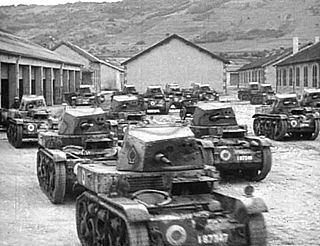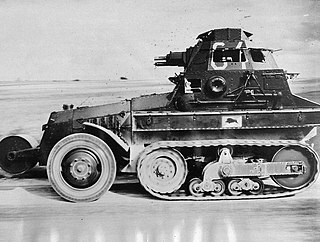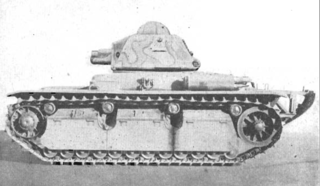See also
- Other countries' production figures
This is a list of French combat vehicle production before and during the Second World War. The numbers given are generally those of vehicles actually delivered including exported vehicles. However, it includes those vehicles not yet delivered in June 1940 in the 1940 totals. For the Renault FT only the French metropolitan organic strength and matériel reserve is given. The list excludes those types having been taken out of service by May 1940.
| Model | before 1 September 1939 | 1939 | 1940 | Total |
|---|---|---|---|---|
| Char 2C | 10 | — | — | 10 |
| Renault FT | 1580 | — | — | 1580 |
| NC27 | 36 | — | — | 36 |
| Char D1 | 160 | — | — | 160 |
| Char D2 | 50 | — | 50 | 100 |
| R 35 | 1070 | 200 | 400 | 1670 |
| FCM 36 | 100 | — | — | 100 |
| Char B1 | 163 | 42 | 200 | 405 |
| AMR 33 | 123 | — | — | 123 |
| AMR 35 | 167 | — | — | 167 |
| ZB | 16 | — | — | 16 |
| ZT2 | — | — | 10 | 10 |
| ZT3 | 10 | — | — | 10 |
| ZT4 | — | — | 40 | 40 |
| AMC 34 | 12 | — | — | 12 |
| AMC 35 | 29 | 23 | 5 | 57 |
| Hotchkiss H35 | 640 | 130 | 430 | 1200 |
| SOMUA S35 | 270 | 50 | 110 | 430 |
| Total | 4436 | 445 | 1245 | 6126 |
The following points should be taken into consideration:
The numbers given for 1 September 1939 and the 1939 totals are those of the deliveries; actual production numbers were in general somewhat higher as the army would only accept those vehicles that could be used immediately to equip units and training lagged behind production. So the number for 1939 is lower than the actual production; e.g. the ZT2's were produced towards the end of 1939. This growing backlog led to a sudden release of tanks in May which is sometimes mistaken for a jump in production. However actual production in 1940 again lagged behind production goals: 477 for the last four months of 1939 and 1226 for the first five months of 1940 only. It was planned to build 3087 tanks in the last seven months: 840 R 40's, 373 Char B1's, 1750 H 35's and 124 S 35/40's; these numbers included a monthly production of 75 H 35's in Britain.
Armoured car and half-track AFV deliveries were:
| Model | before 1 September 1939 | 1939 | 1940 | total |
|---|---|---|---|---|
| AMD White TBC | 86 | — | — | 86 |
| AMD Laffly 50 | 98 | — | — | 98 |
| AMD Laffly 80 | 28 | — | — | 28 |
| AMD Laffly S15 TOE | 45 | — | — | 45 |
| AMD Berliet VUDB | 32 | — | — | 32 |
| AMD Panhard 165/175 | 30 | — | — | 30 |
| AMD Panhard 178 | 219 | 69 | 243 | 533 |
| AMC Schneider P 16 | 96 | — | — | 96 |
| Total | 634 | 69 | 243 | 946 |
It was intended to continue the production of the AMD 35 Panhard 178 at a rate of sixty per month. The Panhard 178 numbers include some hulls not fitted with a turret, but exclude the continued production in 1940 for Germany which probably amounted to 176 vehicles. [4]
After the armistice in the unoccupied Free Zone of France, a clandestine rebuild took place of 225 GMC Trucks into armoured cars. When all of France was occupied in 1942, the secret hiding places (caves in fact) were betrayed to the Germans. [5] [6]

The Renault FT is a French light tank that was among the most revolutionary and influential tank designs in history. The FT was the first production tank to have its armament within a fully rotating turret. The Renault FT's configuration became and remains the standard tank layout. Consequently, some armoured warfare historians have called the Renault FT the world's first modern tank.

The Automitrailleuse de Reconnaissance Renault Modèle 1933 was a French light cavalry tank developed during the Interbellum and used in the Second World War.

The Automitrailleuse de Reconnaissance Renault Modèle 35 Type ZT was a French light tank developed during the Interbellum and used in the Second World War. It was not intended to reconnoitre and report as its name suggests but was a light armoured combat vehicle, mostly without a radio and used as a support tank for the mechanised infantry.

The Renault R35, an abbreviation of Char léger Modèle 1935 R or R 35, was a French light infantry tank of the Second World War.

The AMC 34 was a French tank originally built for the French Army's cavalry units. Its production was cut short, and the few vehicles produced were out of service by the time of the Battle of France in the Second World War.

The SOMUA S35 was a French cavalry tank of the Second World War. Built from 1936 until 1940 to equip the armoured divisions of the Cavalry, it was for its time a relatively agile medium-weight tank, superior in armour and armament to its French and foreign competitors, such as the contemporary versions of the German Panzer III medium tank. It was constructed from well-sloped, mainly cast, armour sections, that however made it expensive to produce and time-consuming to maintain.

The AMC 35, also known under a manufacturer's designation Renault ACG-1, was a French medium cavalry tank of the later Interwar era that served in the Second World War. It was developed as a result of the change of the specification that had led to the design of the AMC 34, calling for a vehicle that was not only well-armed and mobile but also well-armoured. Due to technological and financial problems production was delayed and limited. The AMC 35 was one of the few French tanks of the period featuring a two-man turret.

The Char B1 was a French heavy tank manufactured before World War II.

The Hotchkiss H35 or Char léger modèle 1935 H was a French cavalry tank developed prior to World War II. Despite having been designed from 1933 as a rather slow but well-armoured light infantry support tank, the type was initially rejected by the French Infantry because steering proved difficult during cross-country use, and was instead adopted in 1936 by the French Cavalry arm.

The Lorraine 37L or Tracteur de ravitaillement pour chars 1937 L, is a light tracked armoured vehicle developed by the Lorraine company during the interwar period or interbellum, before the Second World War, to an April 1936 French Army requirement for a fully armoured munition and fuel supply carrier to be used by tank units for front line resupply. A prototype was built in 1937 and production started in 1939. In this period, two armoured personnel carriers and a tank destroyer project were also based on its chassis. Mainly equipping the larger mechanised units of the French Infantry arm, the type was extensively employed during the Battle of France in 1940. After the defeat of France, clandestine manufacture was continued in Vichy France, culminating in a small AFV production after the liberation and bringing the total production to about 630 in 1945. Germany used captured vehicles in their original role of carrier and later, finding the suspension system to be particularly reliable, rebuilt many into tank destroyers of the Marder I type or into self-propelled artillery.

The Panhard 178 or "Pan-Pan" was an advanced French reconnaissance 4x4 armoured car that was designed for the French Army Cavalry units before World War II. It had a crew of four and was equipped with an effective 25 mm main armament and a 7.5 mm coaxial machine gun.

The AMC Schneider P 16, also known as the AMC Citroën-Kégresse Modèle 1929 or the Panhard-Schneider P16, was a half-track that was designed for the French Army before World War II.

The Renault R40 or Char léger modèle 1935 R modifié 1939 was a French light infantry tank that was used early in World War II, an improvement of the Renault R35, of which it is often considered a variant.

The ARL 44 was a French heavy tank and tank destroyer, the development of which started just before the end of the Second World War. Only sixty of these tanks were ever completed, from 1949 onwards. The type proved to be unsatisfactory and only entered limited service. The tank was phased out in 1953.

The Char D2 was a French medium tank of the interwar period.

French development into tanks began during World War I as an effort to overcome the stalemate of trench warfare, and largely at the initiative of the manufacturers. The Schneider CA1 was the first tank produced by France, and 400 units were built. The French also experimented with various tank designs, such as the Frot-Laffly landship, Boirault machine and Souain experiment. Another 400 Saint-Chamond tanks were manufactured from April 1917 to July 1918 but they were underpowered and were of limited utility because the caterpillar tracks were too short for the tank's length and weight. The most significant French tank development during the war was the Renault FT light tank, which set the general layout for future tank designs and was used or redesigned by various military forces, including those of the United States.

The Tracteur Panhard-Châtillon (French pronunciation:[tʁaktœʁpanaʁ ʃatijɔ̃] was a conventional-cabin, all-wheel drive truck produced between 1911 and 1918 by the French manufacturer Panhard. It was one of the first all-wheel drive trucks used by the French military.
The Panhard AM 40 P, also known as Model 201, was a prototype French armoured car.

The 1st Armoured Division is a unit of the French Army formed during World War II that took part in the May-June 1940 Battle of France.
The 3rd Armoured Division is a unit of the French Army formed during World War II that took part in the May–June 1940 Battle of France.